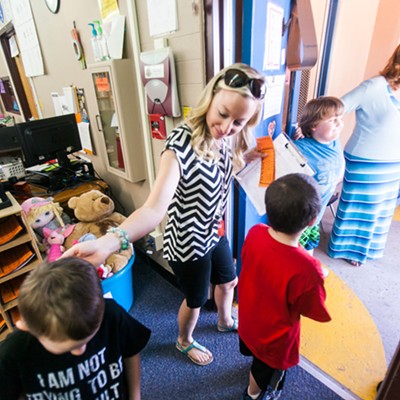The next time a state legislator running for office claims that he or she supports public education, you may want to check the campaign rhetoric against a handy list released this week by the Arizona Education Network.
The public education-advocacy organization tracked the voting records of all state lawmakers during the 2009 Legislature—and discovered that out of 90 legislators, 40 voted against public-education funding 100 percent of the time.
According to Ann-Eve Pedersen, AEN's volunteer spokesperson, the assault on education funding over the last two years leads to a big question: Are these lawmakers violating the state Constitution?
Last year, legislators cut $424 million in K-12 education funding. Pedersen says schools in Tucson felt those cuts when they were forced to cut staff and teachers, increase class sizes, slice special programs (like physical education, art and music) and hack funds for basics like books, paper and ink cartridges.
Two weeks ago, when Gov. Jan Brewer signed the latest budget fix, another $428 million was taken from K-12 funding.
"If Prop 100, the one-cent sales tax, doesn't pass, we can expect deeper cuts," Pedersen says about the May special election.
The Legislature has ripped apart public education over the last two years, Pedersen says.
"The legislators who consistently vote against public-education funding are breaking their oath to uphold the state Constitution," she claims.
Four area politicians made the AEN naughty list: Rep. David Gowan, then-Rep. Frank Antenori and then-Sen. Jonathan Paton of District 30; and Sen. Al Melvin of District 26. Gowan and Melvin are running for re-election. Paton is campaigning against Gabrielle Giffords for the Congressional District 8 seat, while Antenori is running to retain Paton's former state senate seat.
Also included on the list of legislators who voted against public education 100 percent of the time is Sen. John Huppenthal of District 20. The lawmaker from Phoenix is to be running for superintendent of public instruction.
Not surprisingly, Melvin, Huppenthal, Gowan and Antenori are all listed on Grover Norquist's Americans for Tax Reform Taxpayer Protection Pledge Web site. Lawmakers across the country who've signed the pledge vow to "oppose and vote against any and all efforts to increase taxes." Melvin, however, did vote to send the one-cent tax referral to voters in May.
The AEN report (arizonaeducationnetwork.com) also lauds legislators who voted for education funding 100 percent of the time. Only five legislators did so, but three on the nice list are from Southern Arizona: Rep. Daniel Patterson of District 29, and Rep. Olivia Cajero Bedford and Rep. Phil Lopez of District 27.
According to the AEN Web site, not all of the 19 bills that went before the House and Senate regarding public education focused simply on cuts. For example, while most public schools faced the chopping block, one bill unfairly increased charter-school funding—while also protecting charter schools from further cuts. Also at issue are the millions of dollars that continue to go from taxpayers to private schools through vouchers and school-tuition-organization scholarships.
Pedersen shows off an AEN bookmark with part of the state Constitution printed on the back; that passage says that Arizona lawmakers are bound to provide funding for the development and improvement of public schools. The Constitution states: "(T)he Legislature shall make such appropriations, to be met by taxation, as shall insure the proper maintenance of all state educational institutions, and shall make such special appropriations as shall provide for their development and improvement."
Public-education advocates in Arizona like Pedersen have been paying close attention to a lawsuit in Washington state filed by parents, school districts and community organizations, alleging that the state failed to follow its own state Constitution to "make ample provision for the education of all children."
In early February, a King County Superior Court judge ruled that the Washington state Legislature did fail to uphold the state Constitution, and ordered the state to fix the problem. Pedersen says if similar litigation were to be filed in Arizona, it would most likely have to be led by the Arizona Center for Law in the Public Interest. The nonprofit law firm has a history of legal challenges regarding education, most notably in Flores v. Arizona, a lawsuit that forced the state to provide funding for English-language learners.
The center's executive director, Tim Hogan, says such a lawsuit would be a more difficult battle in Arizona, and possibly more lengthy. The Washington lawsuit was first filed in 2004.
Hogan says the challenge is in the wording of the Arizona Constitution, and questions about how a judge would determine the "proper maintenance" of Arizona public schools. The idea of filing a lawsuit, however, is something Hogan says he and his co-workers have discussed.
"But right now, we're looking at Prop 301, and how the state budget cuts violated (that mandate)," Hogan says.
Last year, state lawmakers voted to divert sales taxes from a voter-approved mandate. In 2000, Proposition 301 increased the state sales tax from 5 to 5.6 percent; those dollars were earmarked for K-12 education and higher education. Even though voters passed the Voter Protection Act in 1998 to prevent legislators from undoing citizen initiatives, that hasn't prevented them from diverting those funds.
"Now that, we might be able to take on," Hogan says.













